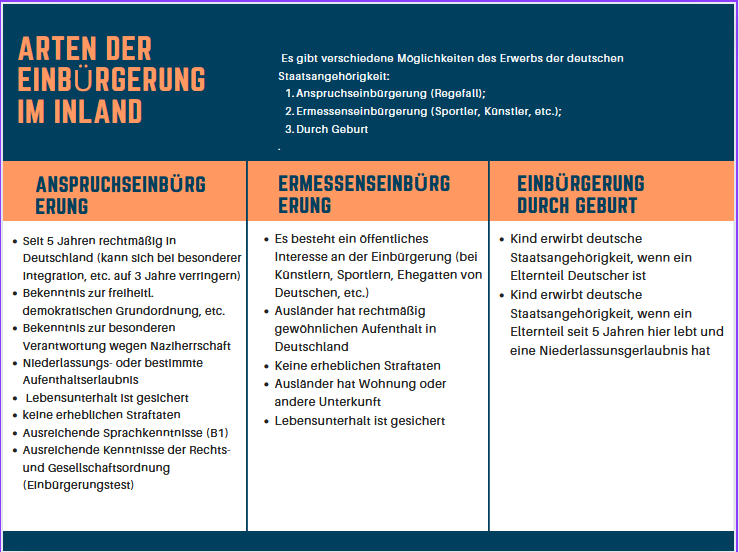Federal Administrative Court, April 26, 2016, Case No.: BVerwG 1 C 9.15
German citizenship law recognizes both the principle of descent (ius sanguinis) and the principle of birthplace (ius soli). Principle of descent as well as the Place of birth principle.

Under the principle of descent, a child acquires German citizenship at birth if either the mother, the father, or both parents are German citizens.
Since January 1, 2000, the principle of birthplace (ius soli) also applies alongside the principle of descent, according to § 4 (3) of the Nationality Act (StAG). According to this provision, children whose parents are not German citizens automatically acquire German citizenship at birth in Germany if one parent has been legally residing in Germany for at least eight years. § 4 (3) StAG states:
„By birth in Germany, a child of foreign parents acquires German citizenship if one parent
- has been legally resident in Germany for five years and
- has lawfully resided in Germany for eight years and holds a permanent right of residence or, as a Swiss national or their family member, holds a residence permit under the Agreement of June 21, 1999, between the European Community and its Member States on the one hand, and the Swiss Confederation on the other, on the free movement of persons (BGBl. 2001 II p. 810).“
A recurring point of contention is which types of residence qualify as „lawful“ under § 4 (3) StAG. In the case discussed here, the Federal Administrative Court had to determine whether stays for study purposes qualify.
The Case
The parents of the plaintiff, born in May 2013 in Germany, were Israeli nationals.
Her father came to Germany in 1999 for study purposes. After marrying a German citizen, he received a residence permit for family reasons in 2004. Following his separation from his German wife in 2006, he was granted a residence permit for study purposes, and in 2010, after successfully completing his medical studies, he received a residence permit to engage in employment. The parents believed that their daughter had acquired German citizenship.
Since September 2011, the father had held a settlement permit. However, when the parents sought to have their daughter’s German citizenship confirmed by the defendant authority, the authority ruled in 2013 that the plaintiff had not acquired German citizenship by birth in Germany because the father’s residence had been temporary for study purposes, which was insufficient under § 4 (3) StAG.
The plaintiff filed a lawsuit against this decision and won in the lower courts, both at the Ansbach Administrative Court and the Bavarian Administrative Court. The defendant appealed to the Federal Administrative Court.
Decision of the Federal Administrative Court
The Federal Administrative Court upheld the lower courts‘ application of the principle of birthplace.
The Federal Administrative Court agreed with the previous rulings and concluded that the plaintiff had acquired German citizenship under the principle of birthplace (ius soli) as enshrined in § 4 (3) sentence 1 of the Nationality Act (StAG). Under the principle of birthplace (ius soli), a child of foreign parents acquires German citizenship by birth in Germany if one parent has a settled residence.
A settled residence requires, among other things, that the parent has lawfully resided in Germany for at least eight years. A lawful residence exists if the foreign national resides in Germany not just temporarily but indefinitely.
The lawfulness of the residence can also stem from a residence permit for study purposes. This is not negated by the fact that such a permit is granted for a specific, inherently temporary purpose. Since the Residence Act came into force in 2005, residence permits for study purposes can also lead to permanent residence. Therefore, they meet the requirements of lawful
The father's entire stay was lawful.
In the present case, the applicant's father had been habitually resident in Germany for more than eight years at the time of her birth (at the time of the decision, 8 years were still required and not 5 years), as there was no end in sight to his residence at any time, despite changing purposes of residence. During this time, his habitual residence was also lawful on the basis of the residence permits issued to him, apart from an interruption of a few days in 2008. The interruption due to a delayed application was also irrelevant according to § 12b para. 3 StAG.
Source: Federal Administrative Court
Important Note: The content of this article has been prepared to the best of our knowledge and belief. However, due to the complexity and constant evolution of the subject matter, we must exclude liability and warranty. Important Notice: The content of this article has been created to the best of our knowledge and understanding. However, due to the complexity and constant changes in the subject matter, we must exclude any liability and warranty.
If you need legal advice, feel free to call us at 0221 – 80187670 or email us at info@mth-partner.de.
Lawyers in Cologne advise and represent clients nationwide in immigration law.



